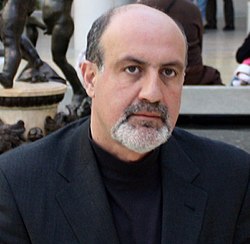Nassim Nicholas Taleb Quote
My biggest problem with modernity may lie in the growing separation of the ethical and the legal
Nassim Nicholas Taleb
My biggest problem with modernity may lie in the growing separation of the ethical and the legal
Tags:
corruption, court system, courts, ethical behaviour, ethics, governement, government, law, law and order, lawyers
Related Quotes
Savers have to be punished so debtors can be saved.Why? Because if debtors are rescued, that makes it possible for more debts to be issued in the future.And why is that important? Because the banking...
Chris Martenson
Tags:
banking, banking system, banks, corrupt, corruption, debt, debtor, economics, economy, finance
Most insensible, corrupt, cheap, disrespectful young girls run after bad, rude, cocky, nonsensical boys, but a mature, educated, thoughtful, virtuos lady opts for a wise, well breed, experienced, humb...
Michael Bassey Johnson
Tags:
adult, adulthood, background, bad boys, callow, cockiness, corruption, disrespect, down to earth, emptiness
About Nassim Nicholas Taleb
Nassim Nicholas Taleb (; alternatively Nessim or Nissim; born 12 September 1960) is a Lebanese-American essayist, mathematical statistician, former option trader, risk analyst, and aphorist. His work concerns problems of randomness, probability, complexity, and uncertainty.
Taleb is the author of the Incerto, a five-volume work on the nature of uncertainty published between 2001 and 2018 (notably, The Black Swan and Antifragile). He has taught at several universities, serving as a Distinguished Professor of Risk Engineering at the New York University Tandon School of Engineering since September 2008. He has also been a practitioner of mathematical finance and is currently an adviser at Universa Investments. The Sunday Times described his 2007 book The Black Swan as one of the 12 most influential books since World War II.
Taleb criticized risk management methods used by the finance industry and warned about financial crises, subsequently profiting from the Black Monday (1987) and the 2008 financial crisis. He advocates what he calls a "black swan robust" society, meaning a society that can withstand difficult-to-predict events. He proposes what he has termed "antifragility" in systems; that is, an ability to benefit and grow from a certain class of random events, errors, and volatility, as well as "convex tinkering" as a method of scientific discovery, by which he means that decentralized experimentation outperforms directed research.
Taleb is the author of the Incerto, a five-volume work on the nature of uncertainty published between 2001 and 2018 (notably, The Black Swan and Antifragile). He has taught at several universities, serving as a Distinguished Professor of Risk Engineering at the New York University Tandon School of Engineering since September 2008. He has also been a practitioner of mathematical finance and is currently an adviser at Universa Investments. The Sunday Times described his 2007 book The Black Swan as one of the 12 most influential books since World War II.
Taleb criticized risk management methods used by the finance industry and warned about financial crises, subsequently profiting from the Black Monday (1987) and the 2008 financial crisis. He advocates what he calls a "black swan robust" society, meaning a society that can withstand difficult-to-predict events. He proposes what he has termed "antifragility" in systems; that is, an ability to benefit and grow from a certain class of random events, errors, and volatility, as well as "convex tinkering" as a method of scientific discovery, by which he means that decentralized experimentation outperforms directed research.
